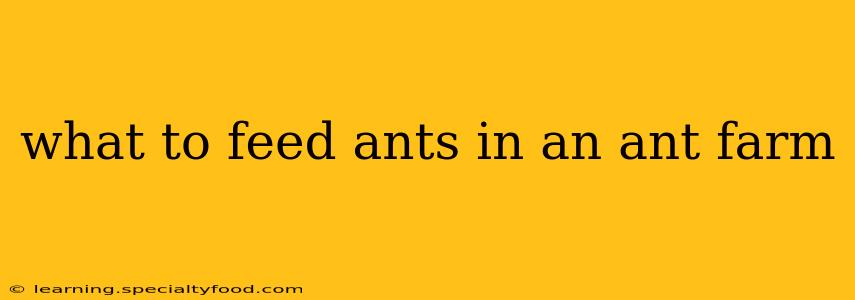Keeping an ant farm is a fascinating way to observe the intricate world of these tiny creatures. But providing the right food is crucial for their health and survival. This guide will answer all your questions about what to feed your ant colony, ensuring their thriving existence within your ant farm.
What Do Ants Eat? A Quick Overview
Ants are omnivores, meaning their diet consists of both plants and animals. The specific diet of your ants will depend on the species, but generally, they'll appreciate a balanced menu. In nature, they eat a wide range of things, from dead insects to sugary nectar and plant sap. This variety needs to be reflected in their ant farm diet.
What to Feed Ants in Your Ant Farm
Here are some excellent food options for your ant farm inhabitants:
1. Sugary Solutions: Ants are attracted to sugars for quick energy. You can offer them:
- Honey: A small drop of pure honey provides a significant energy boost. Be sure to only offer a tiny amount, as excess honey can lead to mold growth.
- Sugar Water: Mix a small amount of sugar (white or brown) in clean water. The ratio should be roughly 1:4 (sugar:water).
- Fruit Juice (diluted): Dilute fruit juice with water to prevent it from being too sugary and sticky.
2. Protein Sources: Ants need protein for growth and development. You can provide:
- Dead Insects: Small, dead insects like crickets or fruit flies (ensure they're properly deceased to avoid pest problems in your farm) provide a good protein source. Thoroughly clean insects before adding them.
- Hard-boiled Egg (tiny piece): A tiny, well-cooked piece of egg yolk provides excellent protein.
- Pet Food (dry, small bits): Very small bits of high-quality dry cat or dog food can serve as a supplemental protein source.
3. Other Food Sources:
- Seeds: Tiny seeds (like poppy seeds or sesame seeds) can be provided in small quantities. Avoid offering large seeds that might clog up the tunnels.
What NOT to Feed Ants in an Ant Farm
It's equally important to know what foods to avoid:
- Anything Salty or Spicy: These can be harmful to ants.
- Moldy or Spoiled Food: This will introduce bacteria and contaminate the environment, causing illness or death.
- Large Pieces of Food: Large food items can get stuck and cause obstructions in the tunnels.
- Foods that contain artificial sweeteners: These can be toxic to ants.
- Processed Foods: Processed foods lack the necessary nutrients for a healthy ant diet.
How Often Should I Feed My Ants?
The feeding frequency depends on the size of your colony and the type of ants. Start by feeding them once every 2-3 days. Observe their consumption and adjust the frequency based on what they leave uneaten. Remove any uneaten food after a day to prevent mold growth.
What if My Ants Aren't Eating?
Several factors could cause your ants to lose their appetite. Check for:
- Stress: A new environment can cause stress, leading to reduced food intake. Give them time to adjust.
- Inappropriate Food: Try offering a wider variety of foods to find their preferences.
- Insufficient Moisture: Ensure proper humidity levels in the ant farm.
- Illness: If you suspect illness, consult ant-keeping resources or forums for advice.
How to Properly Introduce Food to the Ant Farm
Avoid directly dropping food into the tunnels. Instead, use a small spoon or tweezers to place the food near an entrance or in a designated feeding area. This prevents clogging the tunnels and maintains the cleanliness of the farm.
What Kind of Water Do Ants Need?
Water is crucial, but avoid placing free-standing water in the farm, as this can lead to drowning and mold growth. You can add a few drops of water to a cotton ball and place it near a tunnel entrance. They will drink from it without the risk of getting trapped.
By following these guidelines and paying close attention to your colony's needs, you can ensure a healthy and thriving ant farm for years to come! Remember, observation is key; learning your ants' preferences is the best way to provide excellent care.
